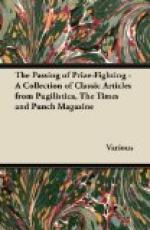He is a perpetual plunderer—a petty purloiner—a pinching petitioner in forma pauperis—a contraband dealer in snuff. However, he is in general noted for his social qualities. He is affable, mild, harmless, insinuating, yielding, and submissive. He never fails to compliment you upon your good looks, and wonders in deep interest where you buy such excellent snuff. He agrees with you that Sir Peter Laurie is the first statesman of the day, and flies into the highest ecstacies when he learns that it is some of George the Fourth’s sold-off stock. He even acknowledges that Universal Suffrage is the only thing that can save the nation, and affects to be quite astonished that he has left his box behind him. He will beg to be remembered to your wife, and leaves you after begging for “the favour of another pinch.” Where is the man whose nature would not be susceptible of a pinch when invoked in the name of his wife?
Goldsmith recommends a pair of boots, a silver pencil, or a horse of small value, as an infallible specific for getting rid of a troublesome guest. He always had the satisfaction to find he never came back to return them.
But with the man who carries no snuff-box this specific would lose its infallibility. It would be folly to lend him your snuff-box, for at this price snuff would lose all its flavour, all its perfume for him. The best box to give him would be perhaps a box on the ear.
If he were obliged to buy his own snuff, it would give him no sensation. The strongest would not make him sneeze, or wring from the sensibility of his eyes the smallest tribute to its pungency. He would turn up his nose at it, or, at the best, use it as sand-dust to receipt his washerwoman’s bills with.
These feelings aside, the man who carries no snuff-box is a good member of society; that is to say, quite as good a one as the man who does carry a snuff-box. He is in general a good friend (as long as he has the entree of your box), a good parent, a good tenant, a good customer, a good voter, a good eater, a good talker, and especially a good judge of snuff. He knows by one touch, by one sniff, by one coup d’oeil, the good from the bad, the old from the new, the fragrant from the filthy, the colour which is natural from the colour which is coloured. If any one should want to lay in a stock of snuff, let him take the man who carries no snuff with him: his ipse dixit may be relied upon with every certainty. He will choose it as if he were buying it for himself, and in return will never forget to look upon it as a property he is entitled to fully as much as you who have paid for it; for, in fact, would you be in possession of the snuff if he had not chosen it for you?
As for his complaint, it is like hydrophilia; no remedy has as yet been invented for it; and we can with comfortable consciences predict that, as long as snuff is taken, and men continue to carry it about with them in snuff-boxes, they are sure to be subject to the importunities of the man who carries no snuff box.




